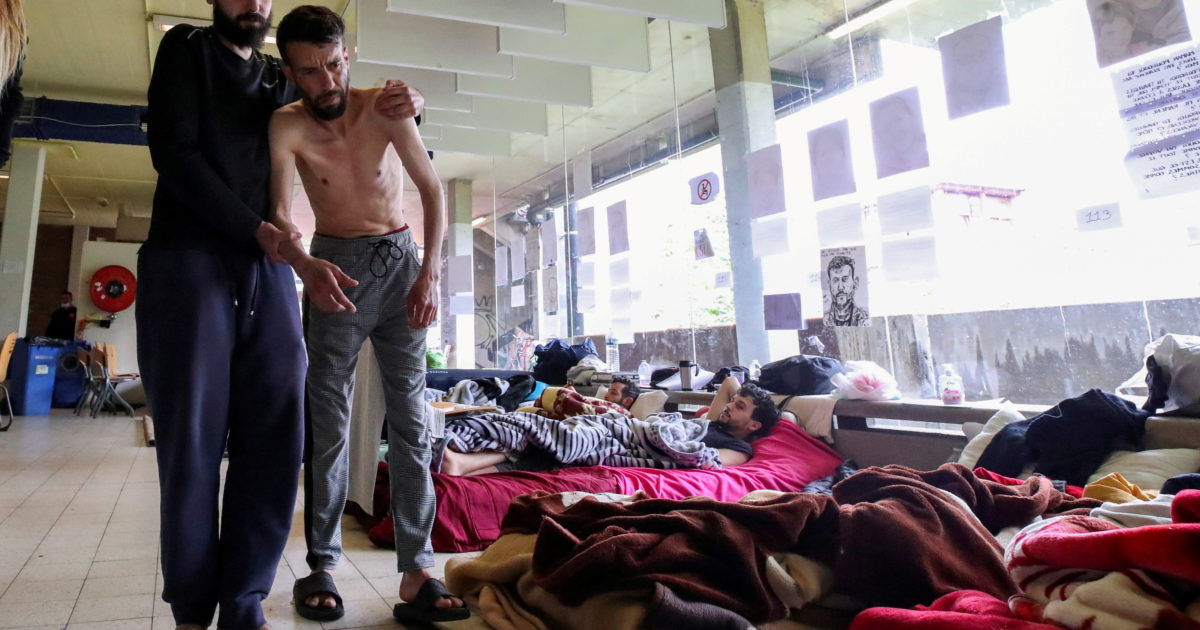Since 23 May, more than 400 undocumented migrants occupying four locations (including a church in Brussels and the Free University of Brussels) have been on hunger strike to get out of too many years of forced clandestinity, lack of rights and protection, violence and overexploitation. The strike followed a political occupation movement launched on 30 January by the Union of Undocumented Migrants for Regularisation (USPR).
The state of health of the hunger strikers, already strained by their condition, is worsening day by day: weight loss of up to 20-30%, heart attacks and hypoglycaemic comas. The despair in which some of them find themselves has led them to attempt suicide, seeing that nothing is moving on the part of the government despite more than a month of hunger strike and more than five months of occupations. Supporters and healthworkers on site confirm this is an unmanageable situation.
“Hunger strikers do not have a right to stay”
The support committee also spontaneously occupied the Office des Étrangers and the headquarters of the French-speaking Socialist Party. The aim was to put pressure on the French-speaking parties that are currently in the Vivaldi coalition, so that they can put regularisation on the table of the federal government De Croo (socialists, ecologists and French-speaking and Flemish liberals, including also the Christian Democrats).
The federal government still has no intention to proceed with a new collective regularisation campaign, and the Secretary of State for Asylum and Migration Sammy Mahdi, whose competences are rather limited, still does not want to deviate from the governmental agreement, which was put in place in 2020 and does not include anything about collective regularisation. Regarding its asylum and migration policy, the Vivaldi coalition led by liberal De Croo had opted for what they call “a firm but humane solution”, i.e. an expulsion policy.
On Twitter, Sammy Mahdi explained: “The hunger strikers do not have a right to stay. Most of them were ordered to leave the country years ago. They didn’t do it, they stayed here working illegally for years and now they are asking for papers. Just because you don’t respect the rules for 5, 10 or 20 years doesn’t mean you automatically get a right of residence. Otherwise, we can abolish all residence procedures. And there are procedures: asylum, student immigration, immigration for work, family reunification, etc. They are accompanied by clear rules. They are accompanied by clear rules.
Building a balance of power
The PS, after rejecting a first proposal from an opposing liberal party, asked a week ago for an interministerial conference to be convened in order to find a solution – without assuming its own responsibilities.
While the situation is becoming critical for the health of undocumented migrants, nothing concrete seems to happen. Several support committees have been set up but they do not function in a coordinated way. Academics, academics, intellectuals, health workers… have spoken out in the press to alert the authorities to the seriousness of the situation.
However, it is not as if the government was unaware of anything. After more than 40 days of hunger strike, it is no longer the time to try to convince a government that has its head in the sand. Building a relationship of forces through a unitary struggle bringing together citizens (with and without papers) from both parts of the country (Flanders and Wallonia), associations, non-governmental political organisations, universities and students is becoming more and more necessary for the regularisation of all undocumented migrants and the freedom of movement and settlement.
8 July 2021






